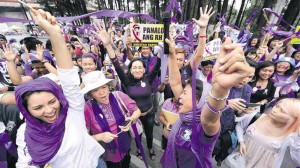MANILA, Philippines—Several groups on Tuesday asked the Supreme Court to restore the penal provisions it struck down when it declared legal Republic Act 10354 or the Reproductive Health Law.
In a 30-page motion for reconsideration, the groups told the high court to reconsider its April 8 ruling that nullified Sections 7, 17 and 23 of the law.
Section 7 is about access to family planning, which provides, among others, that no person shall be denied information and access to family planning services.
Section 17 on the other hand requires health workers to render free reproductive health service for indigent women as a prerequisite in securing PhilHealth accreditation.
Section 23, on the other hand provides that penalties against those who will violate the RH Law.
Some of the penalties nullified are for those who will refuse to perform legal and medically safe reproductive health procedures to minors without parental consent and to married individuals without the spouse’s consent.
“Allowing healthcare service providers to conscientiously object, refuse to refer and refuse to perform certain procedures without spousal and parental consent in non-emergency and non-life-threatening situations is dangerous because it grants a license to a group of people to blatantly violate women’s human rights in the name of freedom of religion,” the group Filipino Catholic Voices for Reproductive Health (C4RH), Inc., Interfaith Partnership for the Promotion of Responsible Parenthood (IPPRP), Emeliza Bayya Mones (former national Council Representative of the UCCP) and Zahria Mapandi, Executive Director of Al-Mujadillah Development Foundation Inc (AMDF) said in their motion for reconsideration.
They also pointed out that requiring spousal consent in non-emergency or non-life threatening cases is discriminatory against women.
“It disregards women’s right to decide on their own bodies. This perpetuates subordination of women, patriarchy, and male domination where our Philippine society has provided a license to healthcare service providers to violate women’s rights with impunity,” the petitioners said.
Petitioners added that disallowing spousal and parental consent will reduce HIV incidence through increased access to contraceptives.
They noted that the annual newly-reported HIV cases rose from 200 in 2004 to 528 in 2008 and the number nearly tripled in 15-24 year-olds from 41 in 2007 to 110 in 2008.
As of January 2013, they noted the Department of Health registered an average of 12 new cases of HIV/AIDS a day and the total of HIV/AIDS cases is now at 12,082.
They also cited the 2010 UNAIDS Report on the Global AIDS Epidemic, the Philippines is one of seven countries globally with more than 25 percent increase in HIV incidence in the last ten years.
“Any delay or snag in the access of contraceptives for adolescents including requiring parental consent significantly impacts the health and lives of our children and adolescents,” the petitioners warned.
“If we require parental consent for adolescents, we are not responding to the call of the times. We will not halt the HIV transmissions in the Philippines,” they added.
The petitioners said, the penalties in RH Law are important because they act as “a deterrent to prevent any further acts of human rights violation.”
“If the penalties are there, all healthcare service providers and government officials have to do is to comply and they would not be criminally liable,” the petitioners said.
RELATED STORIES
‘Trimmed RH law still a boon to moms, kids’
